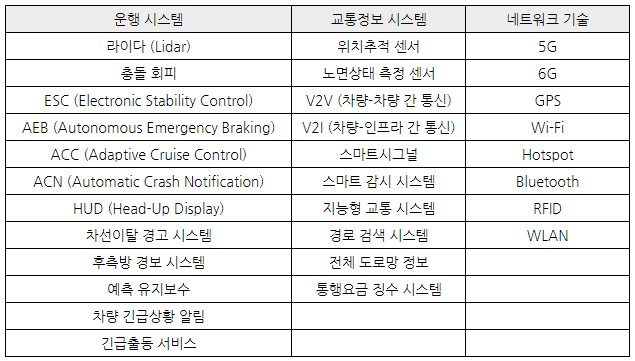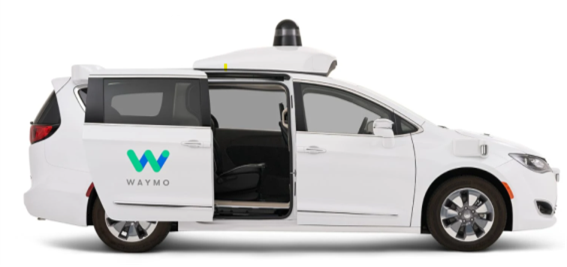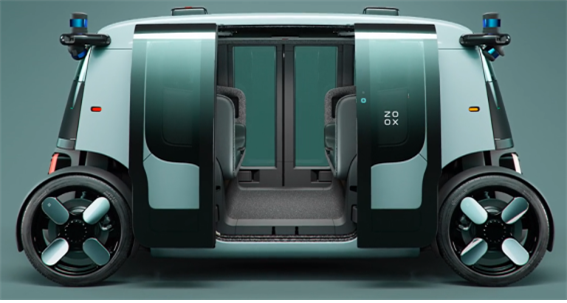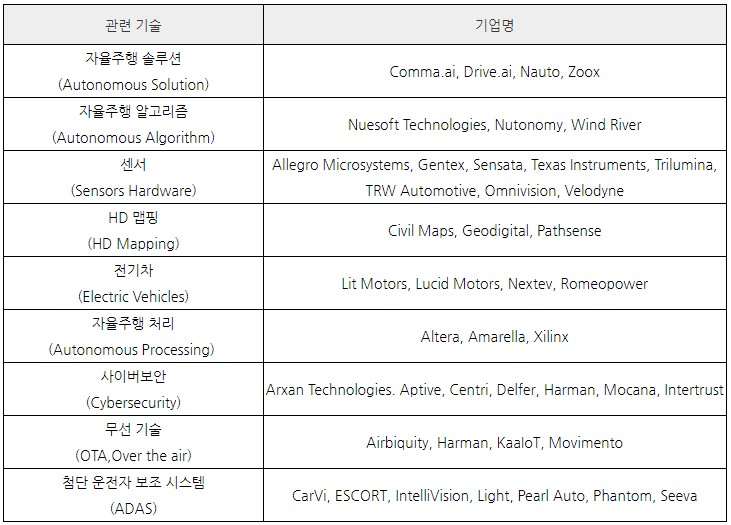2021-08-20 Bae Seong-bong, Chicago Trade Center, USA
– Acceleration of autonomous vehicle development by big tech companies such as Google, Amazon, and Intel –
– Technological cooperation with IT companies and the finished car industry –
The automotive industry is actively utilizing new technologies such as cloud computing, big data, artificial intelligence, and the Internet of Things. In its 2030 Automobile Industry Outlook Report, IBM defined future cars as 'shareable electric autonomous vehicles connected to the Internet' and predicted that 90% of automobile technological innovation will come from software.
The future automobile is a technological fusion of the 4th industrial revolution combined with mobile, Internet of Things, artificial intelligence, and big data. The automotive industry in the next 10 years will have more changes than those of the past 100 years. As an IT powerhouse, Korean companies also need to detect rapidly changing industrial changes in advance and respond quickly.
[Technology required for digital transformation of automobiles]

Source: MnMKS, KOTRA Chicago Trade Center Organized
IT company's autonomous driving business
Google was the first American IT company to launch an autonomous driving business. He has been researching autonomous driving for over 2009 years with Waymo, a driverless car company in 10. In 2018, Waymo launched Waymo One, a self-driving taxi calling service with an assistant driver and passengers on board, and has now entered the trial operation stage of a fully autonomous taxi that does not require any human beings.
It is active in the development and use of Lidar, the eye of autonomous vehicles. Lidar is a sensor that measures the distance using laser reflected light. Recently, Google signed a contract with a domestic company to develop a core chip that controls data collected by lidar/radar sensors in real time.
[Self-driving taxi with Waymo’s self-driving technology]

Source: Waymo
Amazon, the leading e-commerce company in the US, is also developing self-driving cars. In 2019, Amazon invested $5 million in autonomous vehicle technology company Aurora. Aurora's autonomous driving system is rated at a fairly high level. It collects driving route data using lidar, radar, and cameras, and based on this, real-time driving control is possible. It is being developed with the goal of commercializing autonomous driving level 3000 this year.
Another autonomous vehicle company acquired by Amazon, Zoox, also unveiled a fully autonomous taxi to the public in January of last year. It is known that it has invested $1 million in electric pickup truck start-up Rivian to build level 7 autonomous driving technology.
[Self-driving taxi to which Joox's self-driving technology is applied]

Material: Jux
Semiconductor company Intel is concentrating on developing autonomous vehicle technology by acquiring Mobileye, a self-driving technology company. Mobileye excels in road mapping and convergence of camera, lidar and radar-based precision assistance system technologies. Mobileye's cloud-sourced mapping is a big data map technology that has been acquired over a long period of time. It tracks a distance of 100 million km with 800 million vehicles every day, completing the current map of about 10 billion km.
Apple is also known to be developing an autonomous electric vehicle equipped with a self-developed battery through Titan, an electric vehicle development project that has been under way since 2014.
Business-industry cooperation is essential
Collaboration between IT companies and the automobile industry is also active. In addition to competing in the development of fully autonomous vehicles, they also cooperate. The automobile industry cooperates with IT companies because it can receive technology that is difficult to implement on its own.
Microsoft has strengthened cooperation with GM, an automaker. GM is active in the development of electric vehicles as it aims to stop production of internal combustion engine vehicles by 2035. As part of a strategic collaboration, Microsoft has invested $20 billion in GM's self-driving car subsidiary Cruise. Microsoft is said to use its cloud service Azure to support GM's self-driving car development.
Google also decided to provide wireless communication and cloud technology to Ford, a carmaker. The exact terms of the transaction were not disclosed, but Google is said to use cloud technology to digitally transform Ford's sales method and manufacturing process. Google Cloud will also be used for product development, supply chain management, and assembly line inspection. In addition, from 2023, Google's artificial intelligence (AI), Android operating system (OS), Google Map, Google Play, etc. will be introduced to Ford vehicles.
Venture companies are also immersed in the development of digital transformation technology. These technologies will be adopted by automakers in the future to accelerate digital transformation.
Startups evaluated as having technological potential in each field are as follows.
[Major Startups Related to Digital Transformation of the American Auto Industry]

Source: Website of each company, KOTRA Chicago Trade Center
In an interview with the KOTRA Chicago Trade Center, a local car R&D manager said, “The digital transformation of the automobile industry takes place in the production and sales of autonomous vehicles. It is difficult for one company to do everything, so cooperation between companies and industries is not an option, it is a necessity,” he said.
Source: IBM, Google, Waymo, Amazon AWS, Zoox, Rivian, Aurora, Intel, Mobileye, GM, Ford, MarketsandMarket, Frost & Sullivan, AIMultiple, ORO INC, KOTRA Chicago Trade Center



